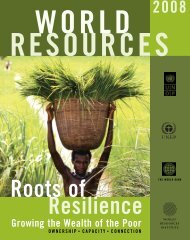jp8589 WRI.qxd - World Resources Institute
jp8589 WRI.qxd - World Resources Institute
jp8589 WRI.qxd - World Resources Institute
Create successful ePaper yourself
Turn your PDF publications into a flip-book with our unique Google optimized e-Paper software.
BOX 2.1 FINDINGS OF THE MILLENNIUM ECOSYSTEM<br />
ASSESSMENT: HOW DO THE POOR FARE?<br />
42<br />
THE MILLENNIUM ECOSYSTEM ASSESSMENT (MA)<br />
was a four-year, international effort to document the contribution<br />
of ecosystems to human well-being, assay the current state<br />
of ecosystem health, and offer a prognosis for how the capacity<br />
of ecosystems to support human needs may change under<br />
different management scenarios. The intent was to provide<br />
decision-makers scientifically credible information to help<br />
them manage ecosystems more sustainably while meeting<br />
human development goals.<br />
The MA was a remarkably broad-based effort. Completed in<br />
2005, it involved over 1300 scientists from 95 countries. It<br />
found that humans have altered the structure and functioning of<br />
the world’s ecosystems more substantially in the second half of<br />
the twentieth century than at any time in human history. As a<br />
result, 15 of the 24 ecosystem services the MA assessed are now<br />
being degraded or used unsustainably (MA 2005a:viii, 1, 6).<br />
This unsustainable use stems from the fact that humans often<br />
favor some kinds of ecosystem production—such as the provisioning<br />
services of food and fiber production—at the expense of<br />
other services that ecosystems can render, such as biodiversity,<br />
water purification, or natural pest control. The MA showed that<br />
such trade-offs among different ecosystem services are the<br />
norm. Particularly over the past hundred years, human management<br />
of provisioning services (food, timber, water, and other<br />
commodities) has degraded the ability of ecosystems to provide<br />
regulating services, such as flood control or pollination. Cultural<br />
services such as recreation and the aesthetic and spiritual<br />
appreciation of nature have also suffered.<br />
At the same time, the findings of the MA have shed new light<br />
on the importance of ecosystems to the poor and how ecosystem<br />
degradation impairs the livelihoods of the poor. Poor<br />
people, particularly those in rural areas in developing countries,<br />
are more directly dependent on ecosystem services and more<br />
vulnerable when those services are degraded or lost (MA<br />
2005a:2-14).<br />
The MA findings document many examples of the human toll<br />
on ecosystems. Approximately 35 percent of mangroves have<br />
disappeared in the last two decades. Twenty percent of the<br />
world’s coral reefs have been lost and an additional 20 percent<br />
are degraded. Water withdrawals from rivers and lakes have<br />
doubled since 1960. Nitrogen flows to the environment have<br />
also doubled, while phosphorous flows have tripled between<br />
1960 and 1990. Landings from inland and marine fisheries<br />
have declined due to overexploitation. Fuelwood used for<br />
energy is scarce in many parts of the world. Some 10-20<br />
percent of drylands are degraded (MA 2005a:2, 26, 31, 34).<br />
Ecosystem Degradation and the Poor<br />
The MA highlights the relationship between the poor and<br />
ecosystem goods and services. While everyone is affected by<br />
ecosystem degradation, the poor suffer the harmful effects<br />
disproportionately. In fact, the disparities between the poor and<br />
rich have grown in recent decades. For instance, despite global<br />
increases in the amount of food available per capita, over 800<br />
million people remain undernourished, and food production per<br />
capita has actually decreased in Sub-Saharan Africa. While<br />
water availability has increased in many regions of the world,<br />
half of the urban population in Africa, Asia, Latin America, and<br />
the Caribbean suffer from contaminated water and its burden of<br />
disease. Ecosystem degradation has very real human and financial<br />
costs. The burning of 10 million hectares of Indonesia’s<br />
forests in 1997-8 resulted in additional health care costs of<br />
US$9.3 billion and affected some 20 million people (MA<br />
2005a:2, 13, 51, 57, 62).<br />
The poor have also suffered from loss of access to ecosystems<br />
through privatization of what were formerly common pool<br />
resources. Examples include inland and coastal fisheries,<br />
which the MA findings reveal to be in steep decline. Smallscale<br />
fisheries are of great value to the poor, providing an<br />
inexpensive source of protein and supplemental income.<br />
Increasingly, coastal areas that were once open fishing grounds<br />
are being converted for use in shrimp farming and other forms<br />
of aquaculture. The harvest from aquaculture ponds or cages is<br />
typically exported, and both the income and the protein bypass<br />
the local poor. Countries where extensive conversion of coastal<br />
habitats for aquaculture is taking place include Ecuador,<br />
Thailand, Vietnam, Honduras, Chile, Indonesia, the<br />
Philippines, Bangladesh, and India (MA 2005b:25.13).<br />
The MA findings also confirm that the substantial degradation<br />
of ecosystems that is now occurring is a barrier to achieving the<br />
Millennium Development Goals. For example, the MA warns<br />
that meeting the goals of eradicating hunger and reducing child<br />
mortality by 2015 will be unattainable if ecosystems continue<br />
to be used unsustainably. Soil degradation and water scarcity<br />
are two important sources of risk to the production of agroecosystems,<br />
and thus to the food supply, particularly as it affects<br />
the poor. The MA makes it clear that failure to tackle the<br />
current decline of ecosystem health will seriously erode efforts<br />
to reduce rural poverty (MA 2005a:61). <br />
For more information on the Millennium Ecosystem Assessment<br />
and its findings, see: http://www.maweb.org.

















